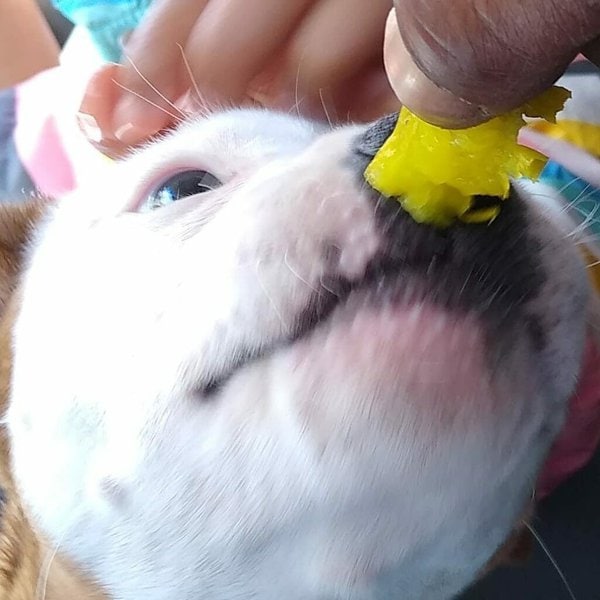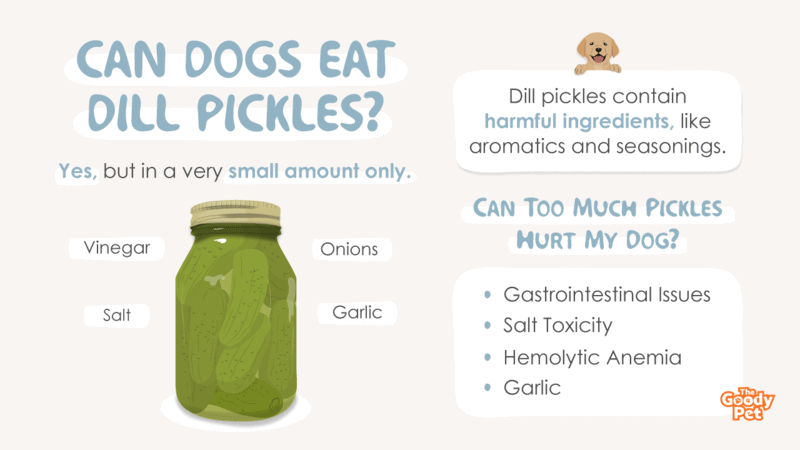Pickles are delicious condiments, and they’re a perfect blend of sweet and tangy with a crunchy texture that most of us enjoy. Two of the most popular types of pickles are dill and kosher pickles, and the difference lies in the added fresh dill and garlic.
Since pickles’ main ingredient is cucumber, does it follow that pickles are good for them? For your dog’s sake, it’s better to stay on the safe side of caution.
Dogs should not eat dill pickles or kosher pickles because such store-bought pickled cucumbers are added with aromatics like garlic and chilies, plus seasonings like salt and pepper. Though both dill and raw cucumber are alright, the other constituting ingredients can potentially harm dogs when given as a regular treat.
Today, you’d learn more about dill and kosher pickles. How come we do not recommend these condiments for your pooch? And what happens if your dog steals some of these? Let’s get the answers now.
Can Dogs Eat Dill Pickles?
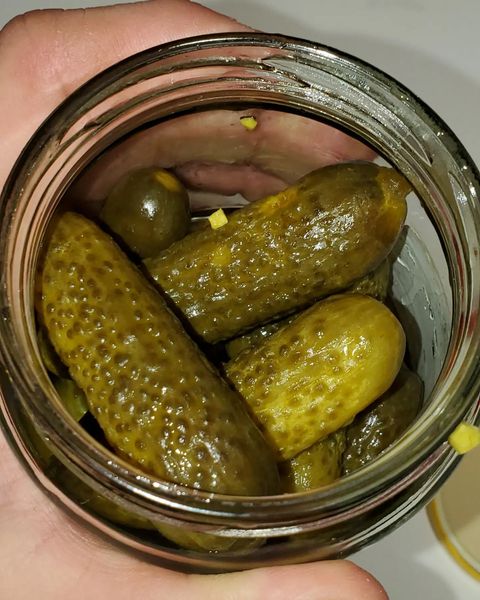
Yes, but in a very small amount only. If you constantly feed your dog with dill pickles, you are looking for some trouble.
Though dill itself is safe for your dog, the other ingredients are the ones that make dill pickles bad for your pooch. The fact that the cucumbers are pickled means that other ingredients are not recommended for your dog.
In this section, we’d talk more about pickling so you can have a better picture of what it takes to make dill pickles.
What Is Pickling?
Pickling is a food preservation technique with the use of either salt, vinegar, or both. The acid prevents food spoilage by killing bacteria.
Pickling is a century-old method of preserving food like meat and vegetables.
Are The Ingredients Of Dill Pickles Bad For My Dog?
Yes, we’ll go through the basic ingredients of dill pickles and let you know why most of these kitchen essentials are not good for your fur baby.
Dill
A type of herb that is alright for your dog. Dill is a great source of antioxidants that can reduce inflammation and help prevent the cognitive effects associated with aging.
And, if you’re unhappy with your dog’s breath, dill is one way to freshen its stinky breath. Dill is also known to treat digestive discomforts in dogs.
But for your pooch to enjoy the benefits of dill, it has to be eaten fresh. It’s because pickling destroys the nutritional benefits of fresh dill.
Vinegar
This kitchen staple is generally safe for dogs. However, if your dog has kidney problems, you shouldn’t let your dog eat anything that contains vinegar, such as pickles.
It’s also worth mentioning that not all dogs have the same reactions to vinegar. If they consume more than the recommended amount, some dogs could suffer from gastrointestinal issues.
Salt
Almost all bottled pickles contain salt. One teaspoon of salt contains 2,300 mg of sodium. And how much do you think is the recommended sodium intake of your dog? Only 100 mg per day.
For this reason, if your dog is diagnosed either with heart or kidney disease, it’s not safe for it to consume dill pickles.
Even if you argue that your dog is generally healthy, pickles with their huge amount of salt can cause salt toxicity.
Onions
Onions are aromatics that are used in making pickles. They belong to the Allium family that also includes leeks and scallions.
Onions contain n-propyl-disulfide, a compound that can potentially destroy your dog’s red blood cells and can cause hemolytic anemia.
The signs of anemia to watch out for are loss of appetite, fatigue, and kidney damage.
From these ingredients alone, you’d see why you should not share some dill pickles with your dog. The other ingredients that are added to making dill pickles are chilies and peppers.
What about kosher pickles? Are these unhealthy as dill pickles for your pooch?
Can Dogs Eat Kosher Pickles?
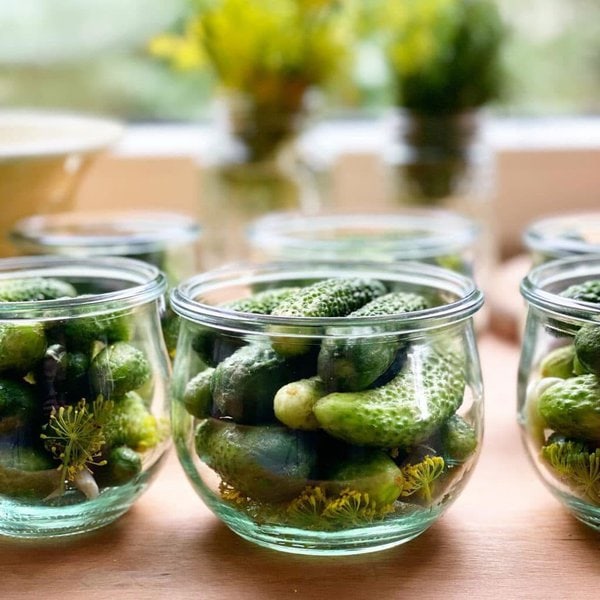
Yes, but only in moderation. Again, same as dill pickles, kosher pickles are also made with salt and aromatics.
Are The Ingredients Of Kosher Pickles Bad For My Dog?
Yes, it’s because dill and kosher pickles basically have the same ingredients except that for dill pickles, dill is added, giving dill pickles a distinct flavor.
Now a pickle is called kosher when it meets the Jewish dietary laws called kashrut. This means that the pickles should be made with brine, garlic, and kosher salt.
Typically, most pickles, including dill pickles, do not add garlic. Though it is not a religious dietary restriction, kosher pickles are not authentic if garlic is not added.
As with onions, garlic is also a member of the Allium family and is considered even more potent than onions.
If your dog has eaten toxic doses of garlic, its red blood cells can get damaged and can possibly make your dog anemic.
May we also reiterate that the signs of garlic poisoning take time to manifest for several days. So, if you keep on giving kosher pickles as dog treats, you may not know it, but you are slowly and unintentionally garlic poisoning your dog.
Will Pickles Hurt My Dog?
Yes, regardless of whether it’s dill or kosher pickles, your dog will eventually suffer the consequences if you feed it with more than the recommended amount of pickles.
Also, any type of human food that is abruptly given to dogs can spell disaster. If your pooch has never eaten pickles before, it’s possible its system won’t accept pickles.
Remember that your dog’s sense of smell is very strong. Thus, the smell of vinegar may be too overwhelming. Your dog might eat the pickles but may eventually vomit because of the strong smell of vinegar.
Again, we just want to reiterate that veggies like garlic and onions are not safe for dogs.
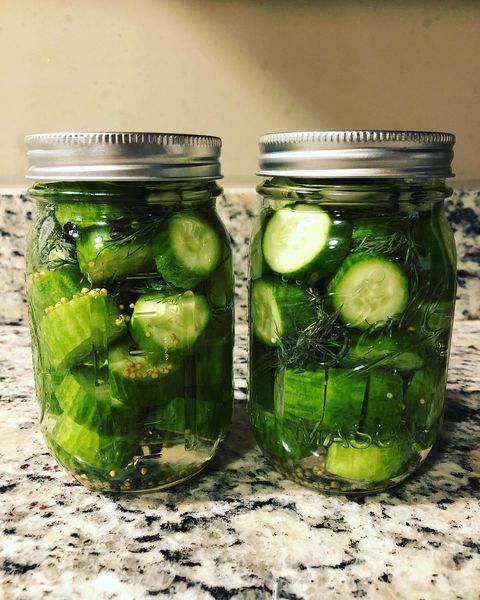
How Many Dill Or Kosher Pickles Can My Dog Safely Eat?
If you are still adamant about sharing dill or kosher pickles with your dog, feeding it occasionally and in small amounts won’t hurt your dog.
We suggest a slice or 2, depending on the size of your dog, every few days to avoid sodium buildup.
Can Pickle Juice Hurt A Dog?
Yes, the pickle juice is nothing but water mixed with tons of salt, vinegar, and other spices to season and preserve the cucumbers.
In case your pooch drinks some pickle juice, make sure to provide it with fresh drinking water at all times. Look out for gastrointestinal distress like vomiting and diarrhea, and call your vet if these symptoms worsen.
How Are Pickles Good For Your Dog?
Though not necessarily a healthy choice for your dog, pickles do offer some benefits, such as:
- Fiber
- Vitamins A and K
- Minerals such as potassium, iron, manganese, and calcium
However, in comparison to high-quality dog food and other types of human food that can be offered as dog treats, the health benefits of dill and kosher pickles are negligible.
If the only reason you want to feed your pooch pickles is to give them treats, your dog is better off eating something healthier, like plain cucumbers.
